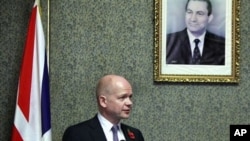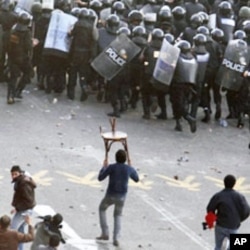Britain's Foreign Secretary William Hague has urged the Egyptian government to move towards political reform in order to calm growing unrest. But some human rights campaigners say western democracies need to do more to pressure Egypt for change.
Speaking on the BBC on Thursday, British Foreign Secretary William Hague said the Egyptian government should take heed of demands for change.
"I do think that it is important in this situation to respond positively to legitimate demands for reform, to move towards openness and transparency and greater political freedom and that would be my advice to Egyptian leaders and to many others around the Arab world," he said.
Egyptians have taken to the streets for a third day of protest against President Hosni Mubarak’s 30 year-rule.
An Egyptian cabinet spokesperson said Thursday that the police are showing maximum restraint in dealing with the protesters. But the head of New York-based Human Rights Watch said he fears the army may open fire in the capital on Friday, when a mass rally is planned.
In a report published earlier this week Human Rights Watch accused the Egyptian government of political repression and widespread discrimination against Christians and other religious minorities.
Massoud Shadjareh, the head of the Islamic Human Rights Commission in London, says William Hague’s comments on Thursday are not enough - Britain and the United States need to do more to pressure Egypt for change.
"Some way it seems that when it comes to Egypt the Western powers, Britain and the United States, are only willing to make comments and nothing more and I think that is really something that is understood by the Egyptian authorities and indeed it's because of that that there are not only continuing but escalating human rights abuses," he said.
On Wednesday the U.S. Secretary of State Hillary Clinton called on President Mubarak to implement reforms. The U.S., she said, supports the “universal rights” of the Egyptian people.
But Egypt is one of the United State’s main allies in the Middle East and the fourth largest recipient of U.S. aid after Afghanistan, Pakistan, and Israel.
That support is propping up a repressive government, says Shadjareh, and that’s in part what this week’s demonstrations are protesting.
In London, people from the Egyptian Diaspora held a small protest outside the Egyptian Embassy on Wednesday. Shadjareh says those protesting were not just making a statement against the Egyptian government.
"The frustration by the demonstrators, and I think this is very clear, is the frustration with the Egyptian authorities but also frustration is with the way the West has been quietly supportive of those regimes," he said.
The unrest in Egypt followed an uprising in Tunisia that ousted the country’s president earlier this month. Both countries are suffering economic challenges with rising costs and high unemployment.












